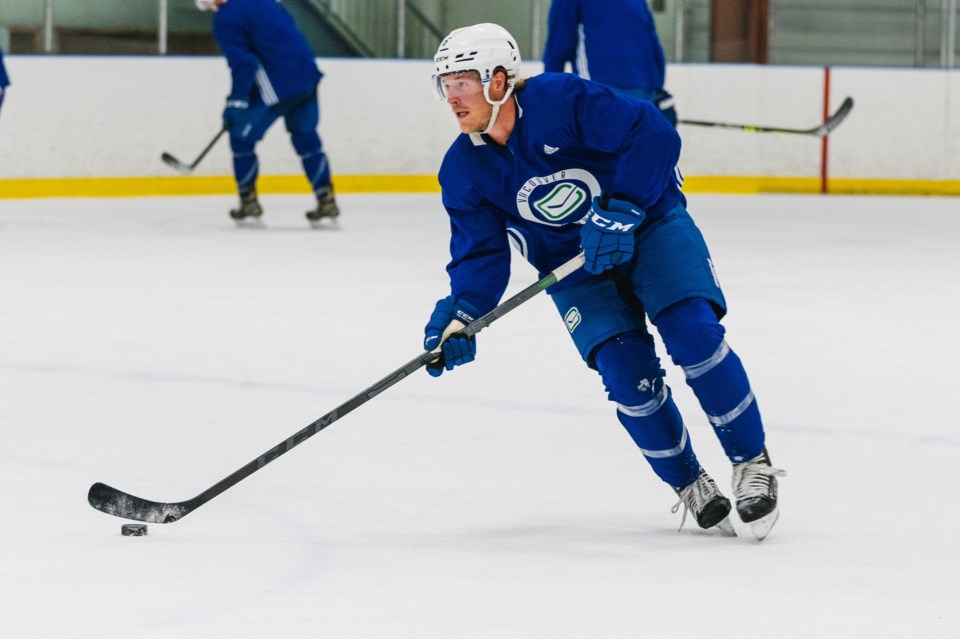Brock Boeser said that he “almost hated hockey for a while” last season as he was dealing with his father’s declining health.
“The stress on my mom really bothered me. That really took my mindset last year away from hockey. In a way, I blamed hockey for not being with my parents,” said Boeser to Postmedia’s Patrick Johnston. “I almost hated hockey for a while.”
Boeser’s perseverance to find his passion for the game of hockey again is why he is the Vancouver Canucks’ nominee for the Bill Masterton Memorial Trophy.
The Masterton is awarded annually to an NHL player “who best exemplifies the qualities of perseverance, sportsmanship, and dedication to hockey.” Each chapter of the Professional Hockey Writer’s Association (PHWA) nominates a player from the team they cover for the award, each with their own story.
Boeser has faced more than his fair share of tragedies and challenges in his life and career. In 2014, he lost a childhood friend, Ty Allea, to a car accident that also resulted in serious injuries to three of his other friends. Over the past decade, his father, Duke Boeser, struggled with seemingly endless health challenges that weighed heavily on Boeser.
“It’s unfair. He had been through so much. He went through hell,” said Boeser to The Athletic’s Michael Russo. “He was thrown everything at him that a person could be thrown. There’s so many stories of people getting cancer, but there’s not too many stories of a guy getting Parkinson’s, then getting in a terrible car accident, then getting cancer, beating cancer, getting cancer again and then a heart embolism, then getting dementia from his Parkinson’s.
“Yet he trucked along for so many years. Never complained. Every time we thought he was done, he’d come back. We just wanted more time with him, and I’m thankful we got a couple extra years.”
Through it all, hockey was Boeser’s escape but that proved challenging as well. His incredible rookie season in 2017-18 was cut short by a freak accident when he was checked into an open bench door and suffered fractured vertebrae — a literal broken back. That injury affected him for years after.
“Even last year, I think I was still learning stuff about my body from past injuries and different exercises I need to do to prep,” said Boeser in 2021. “My rotation to the left, last year and kind of in the playoffs, it wasn't great. It definitely feels freer now and easier to rotate that direction so I think that's really helped a lot.”
Compensating for the back injury led to other injuries, including a groin injury that caused him to miss a big chunk of the 2018-19 season. Further injuries and bouts with COVID-19 kept him out of action in other seasons. The one time he was able to stay fully healthy was in the 2020-21 season, when he led the Canucks in scoring, but that was a season shortened by COVID-19 and the Canucks once again missed the playoffs.
All along the way, Boeser has been dogged by trade rumours of varying veracity.
It’s no wonder that hockey started to feel less and less like an escape for Boeser.
Boeser was hopeful that this season would be different. Fully healthy and with a heavy mental burden lifted from his shoulders, Boeser believed that this would be a career season. When asked about finally hitting the 30-goal mark, Boeser said, “This is the year.”
Then he suffered a hand injury during training camp that required surgery. He pushed himself to come back sooner than projected so he could be in the opening night lineup, but he pushed himself too hard, opening up the scar left over from his surgery. That caused him to miss games and he was clearly not fully healthy early in the season.
Boeser seriously struggled early in the season, particularly defensively. He also didn’t score his first goal until November 18, over a month into the season. Instead of a 30-goal year, it was questionable if he would even reach 20.
But Boeser has improved throughout the season and has found a home on J.T. Miller’s wing under new head coach Rick Tocchet. And, while he won’t be hitting 30 goals, he could still set a new career high in points.
Boeser currently has 54 points heading into the final three games of the season. He needs just two more to match his 56-point career high from his sophomore season. If he can finish the season with a point per game, he’ll break it.
The truth is that Boeser is never going to be the 40-goal scorer that some thought he could be after his rookie season. In fact, he’s turning into more of a savvy playmaker than a sniper, as he’s currently fourth on the Canucks in assists behind Quinn Hughes, Elias Pettersson, and Miller.
“I can still set a career high. It’s crazy,” said Boeser to Johnston. “When you look back at my first half of the year, it was not good at all! So that excites me, because I want to finish strong. I want to bring these last 20 games into the 80 games next year and see what I can do.”
While Boeser turned around his game on the ice, he was also active off the ice.
Boeser was awarded the Canucks' Daniel and Henrik Sedin Award for community leadership. The award is selected by a panel of Canucks Sports & Entertainment staff members, who see all the work that goes on behind the scenes. Boeser hosts kids from BC Children’s Hospital at games with his Boeser’s Beauties program and donates $1,000 to Parkinson’s BC and Parkinson’s Minnesota for every goal he scores.





